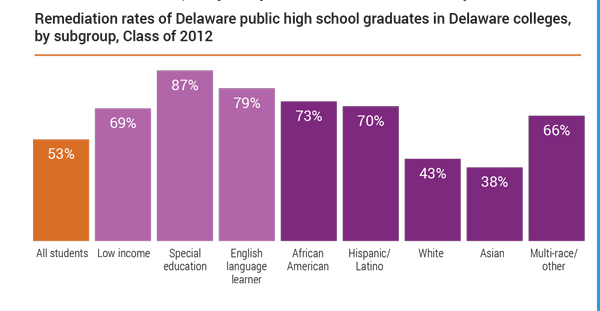Smarter Balanced and College Readiness: What it All Means
Yesterday, the state and several of our higher education institutions shared the news that 11th grade Smarter Balanced assessments are a good measure of college readiness and will be accepted in lieu of a separate placement test at local colleges and universities.
From the release:
“High school juniors started taking the Smarter English language arts (ELA) and Smarter Mathematics assessments Monday, and all students will complete them before June 4. The colleges’ decisions mean that students who score 3 or better on the tests’ 4-point scale now will be able to enroll in credit-bearing English and mathematics classes, as long as they meet certain other conditions, and can avoid taking costly remedial classes that do not count toward graduation. They also will not need to pass a separate placement exam.”
Interesting news, to say the least. There’s loads to unpack here, but here are some of our initial reactions.
- For starters, using Smarter Balanced scores as a stepping stone to college is a key element in aligning high school expectations with actual college readiness.
- Better alignment here also aims to cut down on costly and morale-deflating remediation. Today, more than 50 percent of Delaware students attending in-state colleges need to take remedial classes because they simply aren’t ready for college-level work. Students have to pay for the remedial courses, but don’t earn credit for them. And studies show that students who need remediation are far less likely to receive a degree.
- Smarter Balanced also should help identify students who do need extra help and support to become college-ready before remediation even enters the picture. A student who struggles with Smarter Balanced concepts might consider taking the Foundation of College Math Course in their senior year, which is being piloted in three schools this year, and expanding to more schools for math and English next year.
- Conversely, this agreement might encourage high-achieving students to take dual-enrollment courses during their senior year, potentially saving them tuition money down the road, and getting them ready for the next level, sooner.
- The move also provides an additional opportunity for students to prove they’re ready to take college-level courses. As Matt Albright writes, under the current system, “Schools give a test called “Accuplacer” to determine whether students’ knowledge of basic math and writing skills meet standards. Tuesday’s announcement means students have a second venue to prove they are qualified to start work immediately on courses that will earn them credits.” Accuplacer takes place during the summer before a student’s first year of college, providing little framework for motivation, and little time to adjust their plans. By then, most have already committed to a school and now are forced to pay for courses that will not count toward a degree.
The news surely won’t please everybody. The PTA has already responded in kind. It’s important to remember that Smarter Balanced is still in its first year of implementation. It is by no means perfect, and we as a state should remain steadfast in our quest for continual improvement. There are a range of valid questions about Smarter Balanced, and the test doesn’t hold all the answers. But we believe that a common assessment across grades and schools is critically important for students, parents, educators, taxpayers, and policymakers to know how we are doing. And better alignment from early childhood education through high school and beyond just makes sense, so we believe this news is a step in the right direction.
As UD’s Patrick Harker said:
“By setting policies around the Smarter Balanced Assessments, we can be sure that students are ready for our entry-level courses. That’s good for the school system. It’s good for institutions like us, and most of all, it’s good for students and their families, who will know, early and often, where they stand on the path toward college and work.”
Related Topics: Common Core, Delaware, delaware state, delaware tech, Education, SMARTER Balanced, University of Delaware

